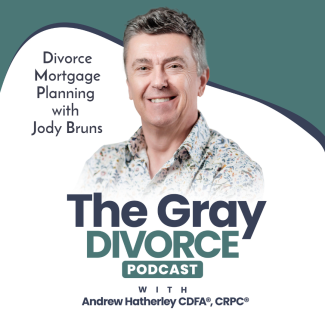
The Gray Divorce Podcast: Episode 15 Divorce Mortgage Planning with Jody Bruns
In episode 15 of the Gray Divorce Podcast, I speak with Jody Bruns. Jody is the President and Founder of the Divorce Lending Association. She oversees the industry certification program for divorce mortgage professionals, known as Certified Divorce Lending Professionals (CDLP).
What is Divorce Mortgage Planning?
We discuss the distinctions between estate planning, financial planning, and the field of divorce mortgage planning. With divorce mortgage planning we are operating in a situation where the party staying in the house may need to refinance or if the house is being sold, both parties may be looking to get a new mortgage or if one party is staying in the house, the party vacating the house may be looking to get a mortgage.
It's important to note that neither lawyers nor divorce financial planners are trained to understand the needs of lenders and the exacting standards they need loan applicants to meet. Quite often marital settlement agreements are written in a way that precludes one or both parties from meeting various criteria needed to qualify for a loan. The sad thing is that it's often a simple matter of the wording of the agreement that needs to be changed or perhaps slight modifications to the settlement agreement. These modifications may be as small as adding a few extra months of spousal support.
One key concept in divorce mortgage planning is known as the 6/36 rule. Jody discusses how lenders need to see six months' proof of receipt of income but also three years (36 months) of continuance once the loan has closed. Being even a few months short of this requirement can cause a lender to deny a loan application.
Divorce Mortgage Planning and Gray Divorce
Older divorcing couples face special challenges with the lending process. In particular, gray divorcees might be in a situation where they have substantial equity in the home, but their income might be reduced because of retirement or working part-time.
Reverse mortgages might play a role in helping some older divorcing people stay in the home and buy out the equity of the other spouse. It may also be possible to sell a home with substantial equity and for each party to use half of that equity to do a forward reverse mortgage, in which case neither spouse would have a mortgage payment on a new home.
Tune into the podcast to see how divorce mortgage planning can play a key role in setting you up with a good financial foundation for the rest of your life after divorce. Jody notes that CDLP's do not add to the professional costs of divorce, ie they do not charge a fee or a retainer, like an attorney. Thus, it would make sense to bring a good CDLP into the divorce conversation as early as possible.

